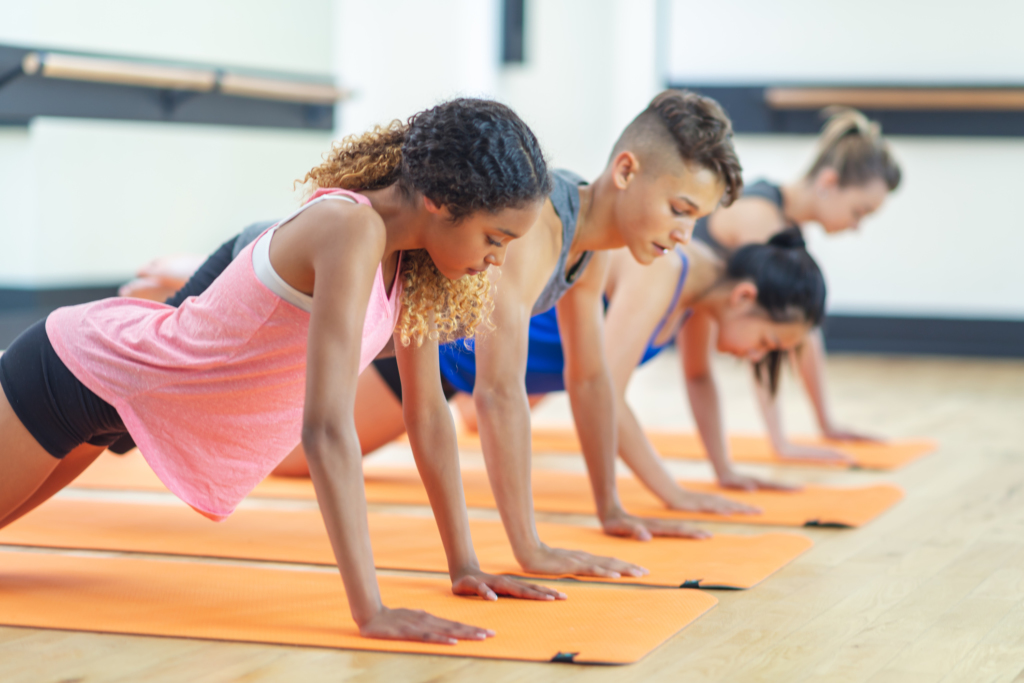Most sports psychologists work with athletes on the mental side of their sport in an office setting. I have found the most productive work I do with athletes is during their actual practice sessions. But, over the last few years, I have discovered an even better setting in which athletes can begin to develop their mental skills: the gym.
Everything mentally that you need to have and do for practice or in competition applies to every set of a workout. You must be highly motivated to give your best effort even when you get tired, bored, or begin to really hurt. You have to have confidence that you can, for example, lift a certain weight or do a particular number of reps. You need a certain mindset to perform the exercise well, for example, an aggressive mindset to attack the lift or a calm mindset for stretching. You must have the high intensity necessary to explode upward with the weight in a lift or the low intensity to get the most out of yoga. You have to be focused on good technique so you execute properly and don’t risk injury.
Here are five key mental skills you can incorporate into your conditioning that can then transfer over to your practice and competitive efforts.
Commitment
For you to get maximum gains from your conditioning, you must want it bad. Before each exercise, make a conscious commitment to put your best effort into it from start to finish. This commitment is particularly important at the end of a set when you need to finish strong in the face of the inevitable pain you feel.
Confidence
Say something positive that will give you a confident state of mind toward the exercise(e.g., “10 reps at 225 lbs., I can do this!”). This is especially important when doubts creep into your mind when you are, for example, doing a new exercise that you’re not that skilled at or you’re going to be attempting a weight you’ve never lifted before.
Mindset
Particularly in strength training, a passive mindset just isn’t going to get the most out of your conditioning. In a way, you’re competing against the exercise; it wants to stop you from, for example, lifting the weight or completing the required number of reps. You have to attack the weight and impose your will on it. Otherwise, near the end of the set, your body will tell your mind to stop and your mind will listen. You must keep an aggressive mindset from the first rep to the last.
Intensity
Many sports-related exercises are about strength and agility, both of which require intensity to get the most out of them. Before every set, “rev your engine” by jumping up and down, taking some aggressive breaths, and using “psych-up” self-talk (“Let’s do it!). When you are doing low-intensity exercises, such as stretching or yoga, relax your muscles, breath deeply, and use “psych-down” self-talk (e.g., “calm and easy”). If your body is at ideal intensity for the exercise, you’ll do it well from start to finish and you’ll gain the most benefit from it.
Focus
Simply put, if you’re not totally focused on your best execution and effort in an exercise, you will not only not perform it well and gain its greatest benefits, but you may also hurt yourself. Before every set, stop talking to people, take a deep breath to direct your focus onto the exercise, take 5-10 seconds and imagine yourself doing the exercise well, and, finally, grab a keyword that reminds you of an important thing you need to do to perform the exercise well (e.g., “reach” or “attack”).
Because mental skills are new and not a part of your conditioning routine, you’ll probably forget to use them sometimes. Don’t beat yourself up about it if you don’t remember every time. At first, you’ll need to be reminded to use the mental skills every set. I would recommend taping a sheet of paper on the wall or mirror of your workout space saying something like, “MENTAL SKILLS!). When you see it, you’ll be reminded to do it. And before you know it, the mental skills will become so ingrained that you use them automatically without needing reminders.
Once you are using mental skills in your physical conditioning, training, and pre-competitive routine, you’ll ingrain them so deeply that when you get to that big event, all of those mental skills will come out and they’ll enable you to perform your very best.
Did you enjoy the article ‘Mental Training Begins in the Gym’? If so, check out 3 Essential Mindsets for Athletic Success, or more of our articles HERE.





